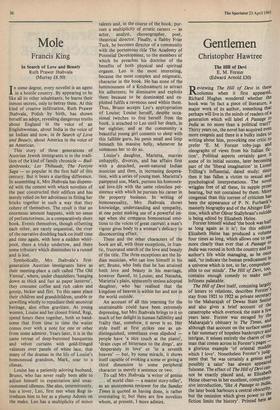Mole
Francis King
In Search of Love and Beauty Ruth Prawer Jhabvala (Murray £8.50) In some degree, every novelist is an agent in a hostile country. By appearing to be like all its other inhabitants, he learns their inmost secrets, only to betray them. At this kind of creative infiltration, Ruth Prawer Jhabvala, Polish by birth, has shown herself an adept, revealing dangerous truths about England in the voice of an Englishwoman, about India in the voice of an Indian and now, in In Search of Love and Beauty, about America in the voice of an American.
This story of three generations of Austrian Jewish immigrants is in the tradi- tion of the kind of family chronicle — Bud- denbrooks, Les Thibauds, The Forsyte Saga — so popular in the first half of this century. But it bears a startling difference. In assembling it, Mrs Jhabvala has dispens- ed with the cement with which novelists of the past constructed their edifices and has merely relied on her adroitness in fitting her bricks together in such a way that they cohere of themselves. The result is that an enormous amount happens, with no sense of perfunctoriness, in a comparatively short book. Events themselves, though offsetting each other, are rarely sequential, the river of the narrative doubling back on itself time and time again, with here a sudden whirl- pool, there a tricky undertow, and there some tributary which diminishes to a runnel and is lost.
Symbolically, Mrs Jhabvala's first- generation Austrian immigrants have as their meeting-place a cafe called 'The Old Vienna', where, under chandeliers 'hanging down as thick and fast as paper lanterns', they consume coffee and rich cakes and gossip, bicker and flirt. To this same place their children and grandchildren, unable or unwilling wholly to repudiate their ancestral heritage, also often gravitate. As young women, Louise and her closest friend, Regi, spend hours there together, both so hand- some that from time to time the waiter comes over with a note for one or other from some admirer. Years later, it is in the same retreat of deep-buttoned banquettes and velvet curtains with gold-fringed valances over panels of white lace, that many of the dramas in the life of Louise's homosexual grandson, Mark, soar to a climax.
Louise has a patiently adoring husband, Bruno, who has never really been able to adjust himself to expatriation and unac- customed idleness. She also, intermittently, has a lover, Leo, first met when Regi in- troduces him to her as a plump Adonis on the make. Leo has a multiplicity of minor talents and, in the course of the book, pur- sues a multiplicity of erratic careers — as actor, analyst, choreographer, poet, theatrical director. Finally, a flabby Friar Tuck, he becomes director of a community with the portentous title The Academy of Potential Development, to the members of which he preaches his doctrine of the benefits of both physical and spiritual orgasm. Leo is the most interesting, because the most complex and enigmatic, character in the book. He has none of the luminousness of a Krishnamurti to attract his adherents; he dominates and exploits them because to be dominated and ex- ploited fulfils a ravenous need within them. Thus, Bruno accepts Leo's appropriation of Louise; Louise herself, despite occa- sional twitches to free herself from the hook, is attached to Leo until her death, in her eighties; and at the community a beautiful young girl consents to sleep with this fallible guru, his penis small and limp beneath his massive belly, whenever he summons her to do so.
Louise's daughter, Marietta, marries unhappily, divorces, and has affairs first with a detached, sweet-natured Indian musician and then, in increasing despera- tion, with a series of young men. Marietta's pampered son, Mark, pursues his homosex- ual love-life with the same relentless per- sistence with which he pursues his career in the property business. In writing of homosexuality, Mrs Jhabvala shows knowledge, understanding and sympathy, at one point making use of a powerful im- age when she compares homosexual emo- tions to the voices of great castrati: a man's vigour gives body to a woman's delicacy to disconcerting effect.
These and the other characters of the book are all, with three exceptions, in fran- tic, frustrated search of the love and beauty of the title. The three exceptions are the In- dian musician, who can lose himself in his art; Bruno, who feels that he has attained both love and beauty in his marriage, however flawed, to Louise; and Natasha, Marietta's plain, apparently sexless adopted daughter, who has realised that the kingdom of heaven is within her and not in the world outside.
An account of all this yearning for the unattainable could have been extremely depressing, but Mrs Jhabvala brings to it so much of her delight in human fallibility and frailty that, somehow, it never is so. Her style itself at first strikes one as un- distinguished, sometimes even slipshod people have 'a nice touch at the piano', `drain cups of bitterness to the dregs', are 'desperately in love' or 'in a seventh heaven' — but, by some miracle, it shows itself capable of evoking a scene or giving a third dimension to some peripheral character in merely a sentence or two.
To call Mrs Jhabvala 'a writer of genius ... of world class — a master story-teller', as an anonymous reviewer for the Sunday Times is quoted as having done, is rather overstating it; but there are few novelists whom, at present, I more admire.










































 Previous page
Previous page